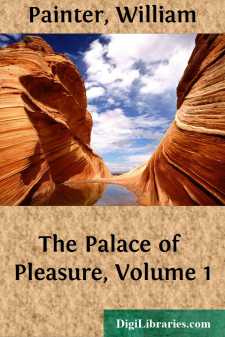Categories
- Antiques & Collectibles 13
- Architecture 36
- Art 48
- Bibles 22
- Biography & Autobiography 813
- Body, Mind & Spirit 142
- Business & Economics 28
- Children's Books 15
- Children's Fiction 12
- Computers 4
- Cooking 94
- Crafts & Hobbies 4
- Drama 346
- Education 46
- Family & Relationships 57
- Fiction 11828
- Games 19
- Gardening 17
- Health & Fitness 34
- History 1377
- House & Home 1
- Humor 147
- Juvenile Fiction 1873
- Juvenile Nonfiction 202
- Language Arts & Disciplines 88
- Law 16
- Literary Collections 686
- Literary Criticism 179
- Mathematics 13
- Medical 41
- Music 40
- Nature 179
- Non-Classifiable 1768
- Performing Arts 7
- Periodicals 1453
- Philosophy 64
- Photography 2
- Poetry 896
- Political Science 203
- Psychology 42
- Reference 154
- Religion 513
- Science 126
- Self-Help 84
- Social Science 81
- Sports & Recreation 34
- Study Aids 3
- Technology & Engineering 59
- Transportation 23
- Travel 463
- True Crime 29
The Palace of Pleasure, Volume 1
by: William Painter
Categories:
Description:
Excerpt
INTRODUCTION.
A young man, trained in the strictest sect of the Pharisees, is awakened one morning, and told that he has come into the absolute possession of a very great fortune in lands and wealth. The time may come when he may know himself and his powers more thoroughly, but never again, as on that morn, will he feel such an exultant sense of mastery over the world and his fortunes. That image seems to me to explain better than any other that remarkable outburst of literary activity which makes the Elizabethan Period unique in English literature, and only paralleled in the world’s literature by the century after Marathon, when Athens first knew herself. With Elizabeth England came of age, and at the same time entered into possession of immense spiritual treasures, which were as novel as they were extensive. A New World promised adventures to the adventurous, untold wealth to the enterprising. The Orient had become newly known. The Old World of literature had been born anew. The Bible spoke for the first time in a tongue understanded of the people. Man faced his God and his fate without any intervention of Pope or priest. Even the very earth beneath his feet began to move. Instead of a universe with dimensions known and circumscribed with Dantesque minuteness, the mystic glow of the unknown had settled down on the whole face of Nature, who offered her secrets to the first comer. No wonder the Elizabethans were filled with an exulting sense of man’s capabilities, when they had all these realms of thought and action suddenly and at once thrown open before them. There is a confidence in the future and all it had to bring which can never recur, for while man may come into even greater treasures of wealth or thought than the Elizabethans dreamed of, they can never be as new to us as they were to them. The sublime confidence of Bacon in the future of science, of which he knew so little, and that little wrongly, is thus eminently and characteristically Elizabethan.
The department of Elizabethan literature in which this exuberant energy found its most characteristic expression was the Drama, and that for a very simple though strange reason. To be truly great a literature must be addressed to the nation as a whole. The subtle influence of audience on author is shown equally though conversely in works written only for sections of a nation. Now in the sixteenth century any literature that should address the English nation as a whole—not necessarily all Englishmen, but all classes of Englishmen—could not be in any literary form intended to be merely read. For the majority of Englishmen could not read. Hence they could only be approached by literature when read or recited to them in church or theatre. The latter form was already familiar to them in the Miracle Plays and Mysteries, which had been adopted by the Church as the best means of acquainting the populace with Sacred History. The audiences of the Miracle Plays were prepared for the representation of human action on the stage....


